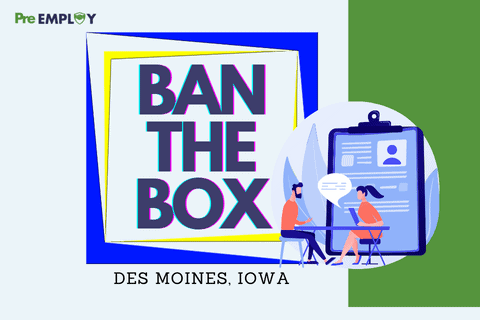Des Moines, Iowa Introduces “Ban-the-Box” Law
- Home
- News Blog
- Ban the Box
- Des Moines, Iowa Introduces “Ban-the-Box” Law

Late last year, the Des Moines city council passed a “ban-the-box” type law to little notice despite the major effects it has on employers now that it has already gone into effect. This law, like most ban-the-box laws, prohibits employers from requesting or conducting inquiries into an applicant’s criminal history until after they have extended a conditional offer of employment.
This ordinance was passed by the Des Moines city council in a unanimous vote which amends the city’s existing municipal code. Under this new law, it is illegal for an employer to include questions pertaining to criminal history on an application for employment or perform a criminal background check or otherwise inquire into a candidate’s criminal history prior to issuing a conditional offer of employment.
More specifically, this law will make it illegal “[t]o make an inquiry regarding or to require any person to disclose or reveal any convictions, arrests, or pending criminal charges during the application process, including but not limited to any interview.” The application process is defined under the law as extending from the time “when the applicant inquiries about the employment being sought and shall end when an employer has extended a conditional offer of employment to the applicant.”
The law further states that employers must comply with federal and state requirements applying to background checks, such as the Fair Credit Reporting Act. This includes notifications concerning adverse decisions “based on an applicant’s criminal history” and other pertinent requirements related to the use of criminal record information. This includes federally and state-required authorizations to perform background checks for employment as well as concerning the use of criminal record information.
This law continues the trend which has grown nationwide in states and localities, introducing ban-the-box type laws that restrict the use of criminal record information. These laws aim to decrease the impact of a criminal record on an applicant’s opportunities to gain employment by restricting access to an applicant’s criminal record until after a conditional offer of employment. As a result, these laws attempt to make potential employers gauge an applicant on their qualifications before assessing their criminal history and making an educated decision on whether or not to rescind their offer of employment.
This law follows in the wake of a ruling last year by the Iowa Supreme Court finding that a similar ordinance in the city of Waterloo did not conflict with the state’s law. As a result of these changes to background check law, employers in the city of Des Moines should take the opportunity to review their hiring practices and policies and ensure that they are compliant with these requirements as well as all state and federal laws.
Make sure your company policies are compliant with new Federal law by learning more about fair chance hiring practices. Download our free resource on Adverse Action Notice Protocols in Compliance With FCRA to get started.
